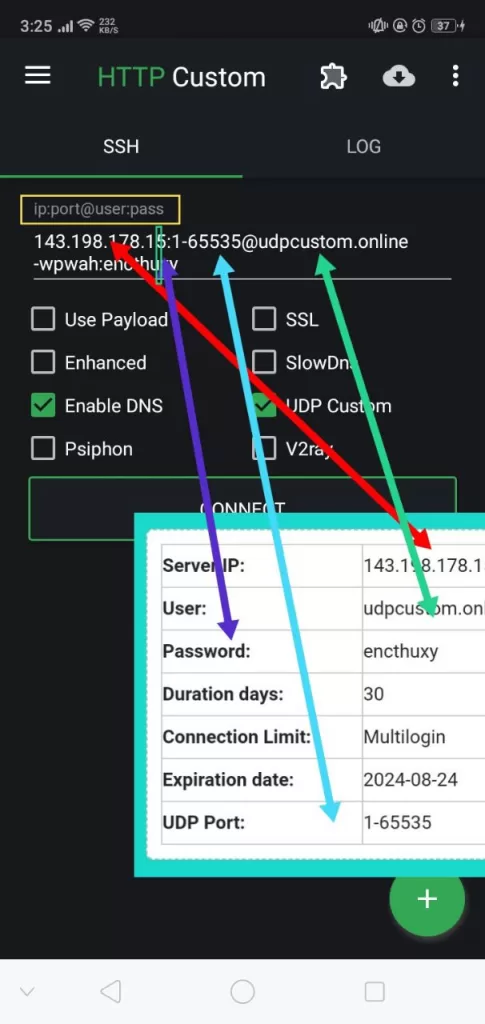30 DAYS VIP Servers
Free PREMIUM UDP CUSTOM Server
How to use this UDP custom server on HTTP CUSTOM

What is UDP Custom?
UDP Custom is a more flexible variation of the traditional UDP protocol, often used in VPNs to optimize the performance of specific network tasks. It allows users or developers to define custom parameters for UDP packets, enhancing performance in particular scenarios like gaming, video streaming, or high-speed file transfers.
Key Features of UDP Custom:
- Custom Optimization: By modifying UDP settings such as packet size or transmission rate, UDP Custom can be tailored for specific network conditions or application needs.
- Compatibility with VPNs: Many VPN services offer UDP Custom configurations to enhance browsing speeds, reduce latency, and improve connection stability for streaming and other data-heavy activities.
UDP Custom is particularly popular for VPNs because it combines the speed of UDP with additional customization, making it more suitable for specific use cases that require low latency and high performance.
VPN (Virtual Private Network)
A VPN, or Virtual Private Network, is a technology that creates a secure, encrypted tunnel between your device and a remote server, masking your IP address and allowing you to browse the internet anonymously. VPNs are essential for maintaining privacy, bypassing geo-blocks, and securing your internet activity, especially when connected to public networks.
Key Features of a VPN:
- Encryption: VPNs use strong encryption protocols to protect your data from hackers and surveillance while it travels through the internet.
- Anonymity: By masking your real IP address, a VPN ensures that your online activities remain anonymous, preventing third parties from tracking your browsing habits.
- Access to Geo-Restricted Content: VPNs allow you to bypass geographical restrictions and censorship by rerouting your connection through servers in different countries.
- Enhanced Security: Using a VPN on public Wi-Fi networks helps protect sensitive data from being intercepted.
VPNs use a variety of protocols to balance speed and security. Some VPNs use TCP for reliable data transmission, while others utilize UDP or UDP Custom for faster, but less reliable, connections.
How SSH, UDP, UDP Custom, and VPN Work Together
Many VPN services use a combination of SSH, UDP, and UDP Custom to provide both secure and fast connections. Here’s how they complement each other:
- SSH Tunneling in VPNs: SSH tunneling can be used within VPNs to establish secure channels for data transmission, ensuring encrypted communication.
- UDP for Fast VPN Connections: VPNs often rely on UDP to provide faster speeds compared to TCP. However, the trade-off is reduced reliability, which is why some VPNs allow users to switch between TCP and UDP depending on their needs.
- UDP Custom for Optimized VPN Performance: UDP Custom adds another layer of flexibility, enabling users to tweak their connection for optimal performance in specific scenarios like gaming, video streaming, or remote access.
Conclusion
SSH, UDP, UDP Custom, and VPN are critical technologies for creating secure, fast, and customizable connections. While SSH ensures data security and encryption, UDP provides low-latency connections for real-time applications. UDP Custom enhances this by allowing for further customization, and VPNs tie it all together by ensuring secure, private browsing. Together, they form a powerful toolkit for modern internet users looking to optimize both security and speed in their digital activities.
